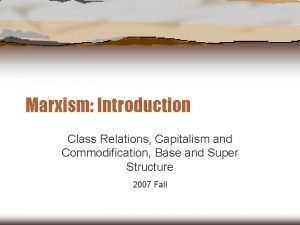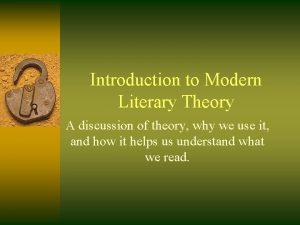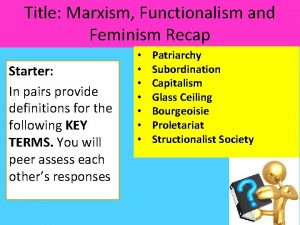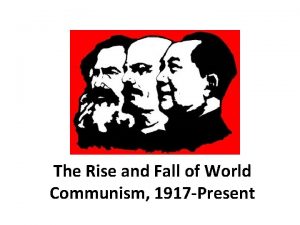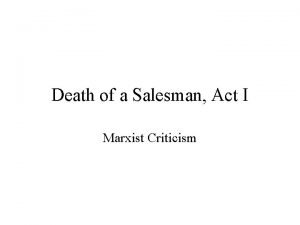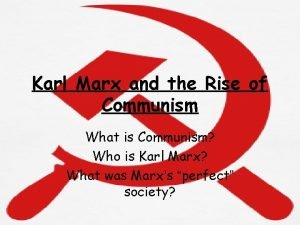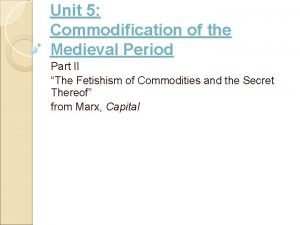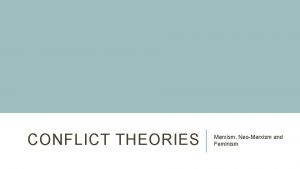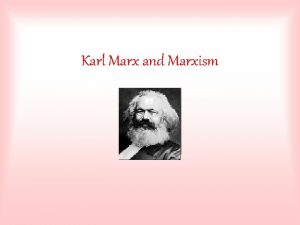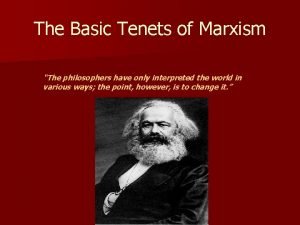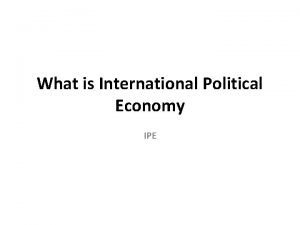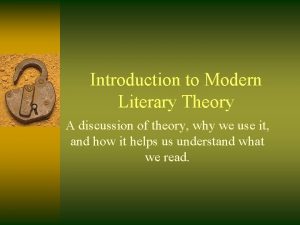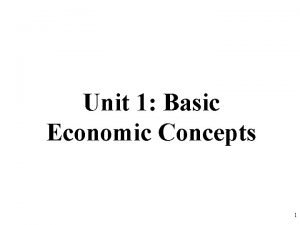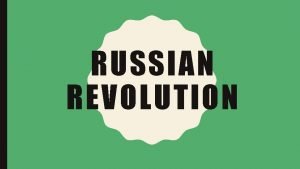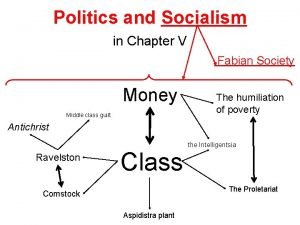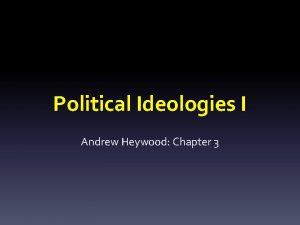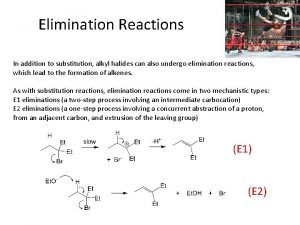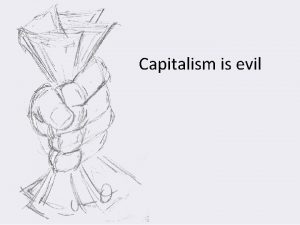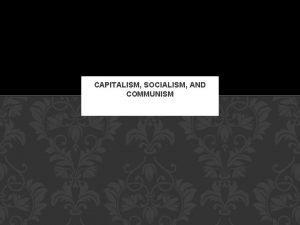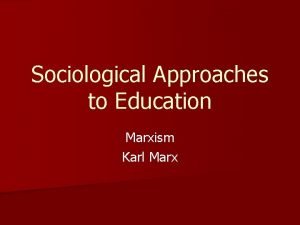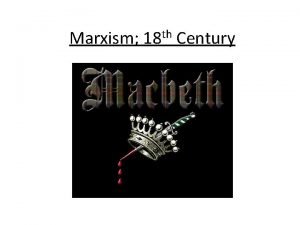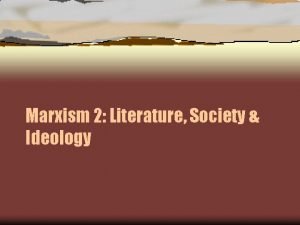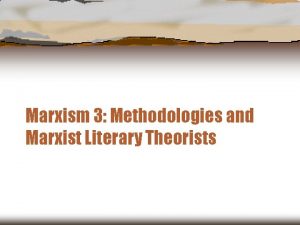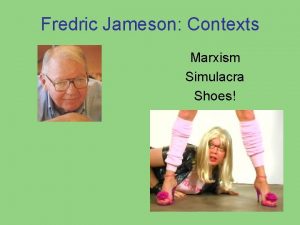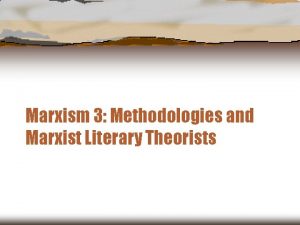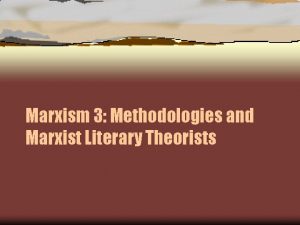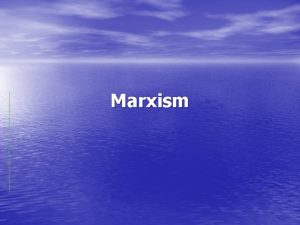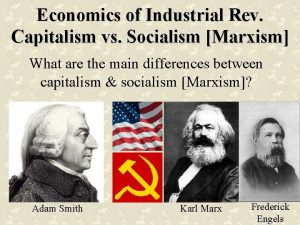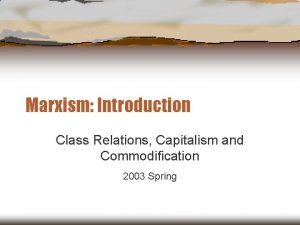Marxism The Ultimate Reaction to Capitalism I Origins





















- Slides: 21

Marxism The Ultimate Reaction to Capitalism

I Origins of Marxism Industrial Revolution Invention: Steam Engine

I Origins of Marxism A. Marxism is a reaction to the “unchecked” capitalism or a free market economy that grew out of the industrial revolution

I. Origins of Marxism • B. Capitalism or a free market economy is an economic system in which privately owned businesses manufacture goods • C. The prices, their distribution & other services of these goods are determined by a free market

I. Origins of Marxism D. It pays particular attention to plight of workers E. It also focuses on the role that the government should play in the economy

II Principles of Marxism A. Social Classes 1. Proletariat-working class/labor/the exploited, usually the majority 2. Bourgeois-the business owner/employers/exploiters, usually a small minority of the population B. Wage Slavery 1. Bourgeois controls all means of production, which results in the abuse (sexual, physical & psychological) of worker 2. Resulting in poverty

II. Principles of Marxism C. Surplus Value 1. human labor must be included in wages & prices 2. Usually the employers does not include labor in calculating wages D. Worker Alienation 1. Workers become increasingly alienated from the products they produce 2. The employers make profits from their work 3. Workers do not have access to the profits from their products

II. Principles of Marxism

II. Principles of Marxism D. Role of Government 1. Government has complete control of key economic sectors 2. Concept of personal ownership is gone 3. Personal property is re-distributed 4. Government is completely responsible for education, healthcare, military, housing, etc

Alienation & Commodity

II. Principles of Marxism E. Alienation & Commodity 1. Worker is not only alienated from his or her product but also from society 2. worker alienation results in the worker becoming a commodity (something that can be bought & sold) 3. Once the worker becomes a commodity, he or she has completely lost their power in society

Alienation & Commodity

III. Revolution Against the Bourgeoisie

III. Revolution Against the Bourgeoisie A. The proletariat must overthrow the bourgeois B. Establish a new government 1. nationalize all economic sectors 2. end private ownership 3. provide housing, education, healthcare, etc 4. end all class distinctions

IV. Utopia: A Perfect Society A. B. C. D. E. No socio-economic classes No family structure No religion No private ownership Communal, everyone shares

V. Forms of Marxism (Marxism in Practice-Cuba) • A. Fidel Castro’s forces took over on January 8, 1959 • B. they confiscated private property, nationalized public utilities, took over most businesses • C. kicked many US companies, such as GE, AT&T

V. Forms of Marxism (Marxism in Practice-Cuba) • • • D. National healthcare system E. Public education 6 to 15 years old F. No freedom of speech, religion, etc G. large population of political prisoners H torture

VI. Socialism • A. the transition between capitalism & communism • B. government has control of some or all key industries, public utilities, housing, banking, etc • C. healthcare & education are provided

VII. Mixed Economy A. combination of Marxism & capitalism B. Both government & privately owned businesses eg post office, Lo’real C. Healthcare, education, Social Security, military, unemployment insurance, welfare, legal aid, etc

VII. Mixed Economy D. Laws regulating businesses, the environment, banking, labor, patents, copyrights, etc E. Basic freedoms guaranteed F. Egs. of mixed economies: US, China, France, UK, India, Germany, Mexico, Japan, Australia

VIII. Free Market Economies Free Trade vs. Fair Trade Free Trade: A. Workers are not fairly paid B. Poor working conditions C. Few or no environmental protections D. Little government intervention Fair Trade: A. Workers or Farmers fairly paid B. Better working conditions C. Some environmental protections D. Government oversight
 Marxism crime and deviance
Marxism crime and deviance Marxism means
Marxism means Base and superstructure in marxism
Base and superstructure in marxism New criticism
New criticism Functionalism vs marxism
Functionalism vs marxism Karl marx quotes malayalam
Karl marx quotes malayalam Death of a salesman marxist criticism
Death of a salesman marxist criticism Communism utopia
Communism utopia Marxist criticism examples
Marxist criticism examples Marxism and feminism similarities
Marxism and feminism similarities Archetypal critical lens
Archetypal critical lens Conclusion of marxism
Conclusion of marxism Principles of marxism
Principles of marxism Liberalism ipe
Liberalism ipe Advantages and disadvantages of marxism
Advantages and disadvantages of marxism Examples of communism
Examples of communism Class struggle marxism
Class struggle marxism Fabian socialism vs marxism
Fabian socialism vs marxism Elements of liberalism according to heywood
Elements of liberalism according to heywood Superstructure sociology
Superstructure sociology E1cb elimination reaction
E1cb elimination reaction Leukoerythroblastic reaction vs leukemoid reaction
Leukoerythroblastic reaction vs leukemoid reaction


